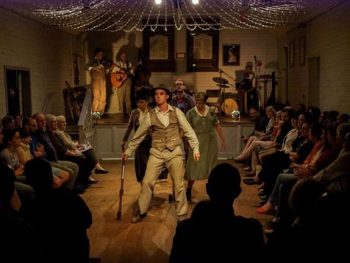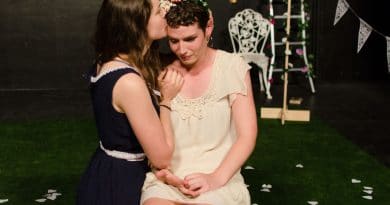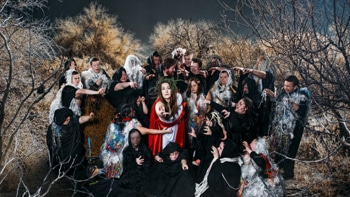Dreamland – Northern Rivers Performing Arts
Eureka Hall, somewhere between Byron Bay and Lismore in the NSW north, has steadfastly stood and served its community for 100 years. These halls are scattered across Australia, community hubs that bear witness to generations of social history. They are the touchstones of regional life and living, the foundation of a community. A meeting place. A sanctuary. A constant.
You can feel it as you walk in: a pulse of lived-in warmth and solidity, a sense of guardianship and care. It’s the perfect setting for the latest production by Northern Rivers Performing Arts (NORPA), who create professional theatre for its community; who could resist the power of this little hall that looms large in collective memory?

Through Dreamland, their love letter to Eureka Town Hall and its hundred years of touching residents’ lives, it’s easy to understand NORPA and the ethos of their work: to connect with the heart of its people by presenting accessible, entertaining, and – pleasantly – challenging performance art. This is nothing simple, but it embraces simplicity. Dreamland is disarmingly intelligent and surprisingly touching.
Written by Janis Balodis and directed by NORPA artistic director Julian Louis, Dreamland is a gently, pseudo-immersive (immersion for beginners?) piece of local storytelling. Set inside the Hall, a young man comes in to enquire about renting it for a soccer club gala. The committee – which is, joyfully, just like every regional committee ever (the tea and biscuits and general fussiness) – has to think about his request. But they also haven’t been getting many bookings lately; times have changed, and priorities have shifted…
And the work shifts too, through time – into post-war healing and hippie invasions and community dances where maybe you could meet the love of your life, once upon a time. It’s a snapshot of hard lives on dairy farms, raising kids and connecting with neighbours, falling in love and losing it.
Kirk Page fronts (Shenzo Gregory leads) a rollicking, only vaguely bushwacked band, and he slips through genre and song style to evoke certain images of time and place. He’s most effective and affecting as the lights come up and the cast (Phil Blackman, Darcy Grant, Katia Molino, Kirk Page and Toni Scanlan) venture out into the heart of the Hall to dance; he croons ‘At Last’ as the audience are invited up out of their pew-like seats to dance with their friends, neighbours, and families. On the night I attended, more audience members rose than didn’t. Kids danced with parents or aunts; lovers lost themselves in the moments; friends laughed and held onto each other.
Dreamland consistently eschews pretension in order to speak to its broadest possible audience. Its cross-section of attendees on the night I visited was arresting: very small children, elderly residents, family and friend groups, couples in their 20s – it’s hard to deny the show’s reach, or its ability to make such a spectrum happy. I didn’t see anyone leave without a giant smile. Balodis’ script is simple, a sketch of various local characters, and that makes it accessible for a wide range of people. It’s staunchly local, littered with site-specific references. It’s musical, and its sixty minute running time moves at a fast clip.
Where it challenges is in its elements of physical theatre and dance. Grant, a founding member of Circa, brings acrobatic movement to the Hall, interpreting history in movement, and Louis has layered in more dance and abstraction in firmly-held context, encouraging his local audiences to engage with something a little more ‘arty’ in the safe space of the Hall, and the most digestible work of easy theatre. There’s something compelling about this dichotomy; each element lifts the other higher.
Its a colonial story, so don’t expect to hear about Indigenous life in the area before the Hall, or expect much diversity in the stories (this is a shame; it’s not as full a portrait as it could be), but it’s an elegant work about modest lives that are frequently rendered inelegant and obsolete by most media.
But the most striking thing about Dreamland is how affirming it is: of local culture, history, and colour. It could only exist in Eureka Town Hall, and it’s a great act of love and generosity for a community that has given such love and generosity itself to NORPA.




